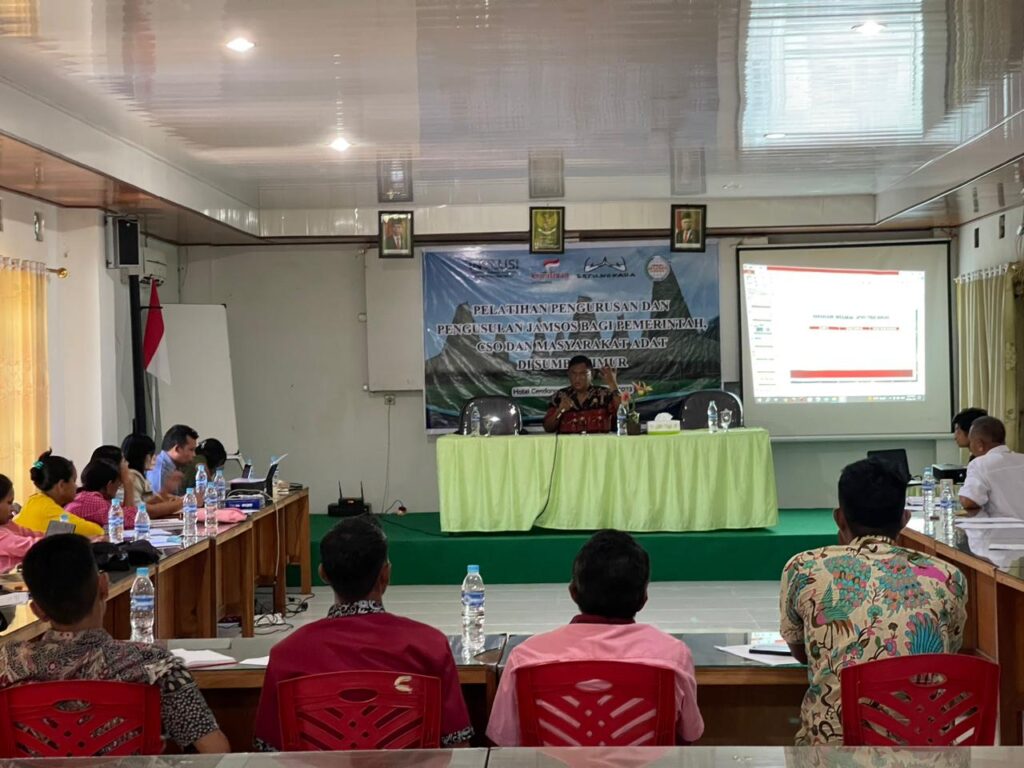Bumi Lestari Institute held training on procedures for managing social security for Village Government Apparatus (APD), Indigenous Communities and Civil Society Organizations (CSO). This activity will last for two days, namely on 23-24 November 2023, in the hall of the Cendana Waingapu Hotel, East Sumba.
Participants consisted of six village heads, six representatives of indigenous communities. This representative consists of six villages assisted by Bumi Lestari. Namely, Wanggameti Village, Mbatakapidu Village, Dapayami Village, Kalamba Village, Meurumba Village, and Mauramba Village.
Also participating were students from Gadjah Mada University (UGM) who conducted research at the Bumi Lestari Institute, and all LBL staff. In this training, the Bumi Lestari Institute presented the head of the East Sumba Regency Social Service, Harun R. Maramba Djawa, S.pt as the main resource person, and the director of LBL, Stef L. Paranggi, as the second resource person.
The Director of LBL explained the purpose of this training so that participants who take part in the training have knowledge of the procedures for administering social security. Especially for vulnerable and disabled groups.
Also, participants can find out the types of facilities for applying for social security so that they can be accessed by vulnerable groups. Also, it is hoped that participants will have knowledge regarding the requirements for beneficiaries who are eligible to access social security from the government.
In his material, the Head of the East Sumba Regency Social Service, Harun R. Maramba Djawa, conveyed several things to pay attention to when applying for social security. One of them is an understanding of government policies in handling the poor which are regulated by law. Then, the types of social assistance and social security that can be accessed by indigenous peoples and marginalized groups. Finally, what is the process for nominating potential aid recipients, starting from data collection, data analysis, to an integrated database.
The types of social assistance include assistance for business groups fostered by institutions such as youth organizations, religious institutions, and TKSK. Meanwhile, community groups in the form of KUBE (Joint Business Group) include Livestock KUBE, Agricultural KUBE, and Fishermen's KUBE. Lastly, assistance for Remote Indigenous Communities (KAT) includes food assistance such as rice and cash.
"With this training activity, we are very open to you, ladies and gentlemen, to communicate directly with me as the head of the department. "So that whatever you want to propose for the needs of poor people in the village, you don't need to hesitate to contact me," explained Harun R. Maramba Djawa.
Harun also added that getting social security requires making a proposal. This proposal must also be accompanied by a Family Card (KK), Identification Card (KTP), and a letter of introduction from the village.
LBL Director, Stef L Paranggi delivered material related to finding models for empowering women and people with disabilities. Stef L Paranggi sparked discussion among the participants to discuss and analyze several questions raised. Among them, imagining themselves as a person with a disability.
The fear you feel when you become disabled and what you will do if other people, even your family, don't care. Also expectations in these conditions, and who is most responsible for these conditions.
Yulius Umbu Nggaba, Head of Maurumba Village, said that this training helped the village government to open access to cooperation with the Social Service. This allows villages to quickly establish coordination with the department in terms of submitting proposals for assistance for the poor and disabled.


